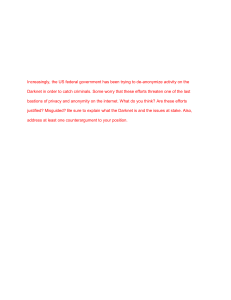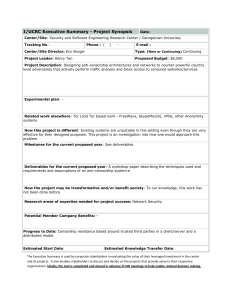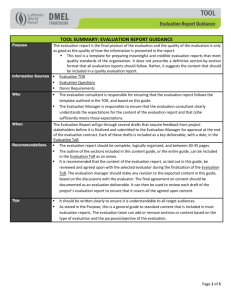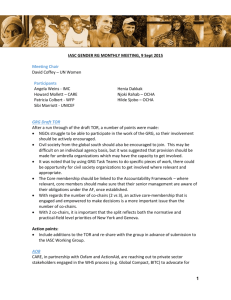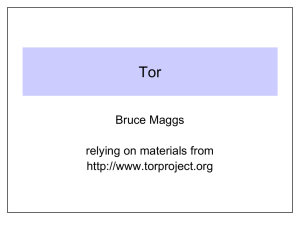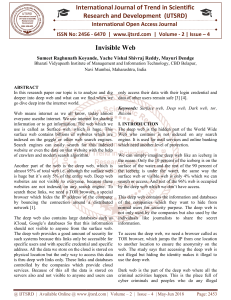But the activism is just one tiny island in this sinister ocean.
advertisement
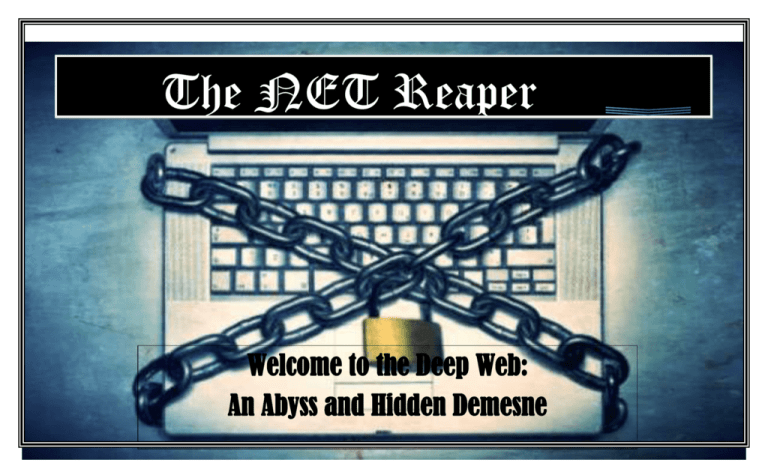
The NET Reaper Welcome to the Deep Web: An Abyss and Hidden Demesne T he Deep Web: An Abyss and Hidden Demesne (By Pablo Albarracín and Christopher Holloway AMERICAECONOMIA) SANTIAGO - "The visible web is the tip of the iceberg," says Anand Rajaraman, co-founder of Kosmix, a search engine for the Deep Web (DW). One of Kosmix’ investors is none other than Jeff Bezos, CEO of Amazon. The iceberg sounds daunting, but Rajaraman seems to know what he's talking about. How is it possible that everything we know about the Internet is only a tiny portion of it? The Deep Web is the invisible part of the Internet. To put it in simpler terms, it is the part of the web that cannot be indexed by search engines, a place where Google does not go: a "dark" web with limited access. "The DW is made up of large amounts of information that has been posted online and that for technical reasons has not been catalogued or updated by search engines," says Alfonso A. Kejaya Muñoz, Security Researcher at McAfee Chile. Studies have shown that the Deep Web represents 90% of the Internet. For those who started using the Internet in its early days, before search engines or web portals even existed, navigating the Deep Web is like a blast from the past. It is hard to find what you are looking for, you need more than a passing knowledge of computer science, and you will have to write down the exact addresses of the sites you manage to find, and stock them in your bookmarks, because it is not easy to remember pages with URLs like SdddEEDOHIIDdddgmomiunw.oni on (the usual format in this territory). "The Deep Web began in 1994 and was known as the 'Hidden Web.' It was renamed ‘Deep Web’ in 2001," says Kejaya Muñoz. "However, some people believe that the origin of the Deep Web goes back to the 1990s, with the creation of 'Onion Routing' by the United States Naval Research Laboratory, which was the first step toward the Tor Project.” Tor (short for The Onion Router) is the main portal to the Deep Web. It encrypts the user's information, in layers like an onion's, and sends it to a wide network of volunteer servers all over the world. This technique makes it almost impossible to track users or their information. Offering anonymity and freedom, the Deep Web has transformed over the years into a deep, almost inhospitable, little-explored information repository that can host anything from the most innocent content to the most ruthless and unthinkable. Within the Deep Web are private intranets protected with passwords, as well as documents in formats that cannot be indexed, encyclopedias, dictionaries, journals, etc. But that is not all. A dark abyss Satnam Narang, Manager of Symantec Security Response, says that because the Deep Web is hidden from view, it is an especially attractive place for shady activities. Many cybercriminals gather in places like private forums with restricted access. Many users are already familiar with the Internet's dark side: how to download music illegally, where to see the latest movies for free, or how to order prescription drugs for a little extra money. But the Deep Web goes farther. Almost unimaginably farther. Child pornography, arms trafficking, drugs, hired assassins, prostitutes, terrorism, etc., all make the Deep Web the largest black market ever to exist. "On the Deep Web you can find sites that sell stolen credit cards, teams that will clone credit cards through ATMs, people selling cocaine, and more," says Dmitry Bestuzhev, director of Kaspersky Lab's team of analysts. Of course, not all uses of the Deep Web sites are "evil." It has also been very helpful to citizens who find their personal liberties threatened, or who are being watched by government agencies. WikiLeaks is an example of one of the uses of the Deep Web. In the beginning, and for a long time, the WikiLeaks site operated in the Deep Web, before it went public. Even today, if someone wants to blow the whistle or upload information to WikiLeaks, it is possible to publish it on the Deep Web. Another example is the group Anonymous, which has used Tor to organize massive attacks on all kinds of organizations. It uses the Deep Web not only for direct actions but also to organize itself. Naturally, it did not take long before this kind of network attracted the attention of the security agencies of various governments. How could they let organizations operate freely, without being hindered by censorship? One of the most obvious examples is Silk Road, a secret web for buying and selling all kinds of drugs. It is estimated that Silk Road makes more than $22 million a year, and police agencies worldwide are scrambling to come up with strategies to stop the online traffic. Recently, the Australian Federal Police and the Australian Customs and Border Protection Service started a joint operation to intercept transactions on Silk Road. Since September 5, detectives have intercepted over 30 packets containing approximately 0.5kg of cannabis, around 200g of synthetic cannabis, around 5g of methylamphetamine, 1g of cocaine, around 400 tabs of LSD and 30 ecstasy tablets, the agency told the Border Mail newspaper. In April, the U.S. DEA was also reported to have taken action against drug trafficking on the Deep Web. The problem is that the transactions can be intercepted, but dismantling the network or tracking the users is almost impossible. There have already been attempts to regulate the Deep Web and Tor. Recently the government of Ethiopia said it has installed security systems that block access to Tor in Ethiopia, to avoid illegal activity and Skype connections, which are regulated there. The effectiveness of that technology is not yet known. Last year, amid the maelstrom of protests and publicity around the proposed SOPA bill (Stop Online Piracy Act), one section of the bill went largely unnoticed: It could make it illegal to distribute Tor and other software that can "circumvent" attempts by the U.S. government to block pirate Web site -- something that has Tor users quite worried. But government and police concern goes beyond trying to destroy or restrict these networks. According to Wired, the U.S. National Security Agency (NSA) has plans to use them for cyber espionage. “The deep web contains government reports, databases, and other sources of information of high value to the Department of Defense and the intelligence community,” said a 2010 Defense Science Board report. Alternative tools are needed to find and index data in the deep web … Stealing the classified secrets of a potential adversary is where the [intelligence] community is most comfortable.” Read the article in the original language. Photo by - Canosa a 5 stelle Deep web: Drugs, guns, assassins, jet planes all for sale on vast anonymous network In some corners there are training manuals on how to firebomb and napalm people. There is even a site dedicated to waging holy war against the West and hitmen give competitive prices for their services. 22 Sep 2012 00:00 Experts say the deep web is 100 or 200 times larger than the internet most users access through browsers like Firefox and Chrome which just scrape the surface of the internet. Experts say it is 100 or 200 times larger than the internet most users access AT first glance it looks a lot like eBay. But this is no ordinary website. For sale is a staggering array of illegal goods being traded openly online – everything from child pornography or Class-A drugs, to guns and British passports. All this is a few clicks away on the deep web, a vast anonymous network hidden from normal web users. And it is all totally untraceable. Ian Walden, Professor of Information and Communications Law, said: “The deep web allows people to communicate without detection. “There is no way of eradicating it completely from the internet, it is simply too big.” There are fears that terrorists are communicating and plotting on the deep web, beyond the reach of security services. All that is needed to operate is special software allowing you to connect with what lies beneath, in this shadowy online world. The software masks your internet identity, encrypting your data and bouncing you through a myriad of worldwide Internet Protocol addresses. Instead of PayPal or credit cards, untraceable Bitcoins, a digital currency unit, is used. enable you to travel to any country and build a new identity. UK driving licences are available from another forger. The site even has an armour plated Land Rover for sale priced £4,245.44, and a jet. An advert for it reads: “The former Ministry of Defence 4x4 offers high protection at very close range – ideal for use in high-risk situations.” Jet: Buy a Gulfstream Reuters Drug deals: Heroin is for sale One of the most popular deep web sites sells every drug imaginable for just a few pounds, delivered to your door. Half a gram of heroin is 6.75 Bitcoins, just £3.85. Cocaine, ecstasy, MDMA ketamine are all available. and As on eBay, users can rate suppliers. One shopper who bought heroin said: “Great seller, shipped all the way to Australia no problem.” Another section on the site sells the equipment needed to manufacture crystal meth and ecstasy. Another sells illegal hardcore porn. British passports, too, are up for sale for £6,000 on a site that boasts it will The Gulfstream jet is competitively priced at £124,973. “Why would you need armour?” is the boast underneath. But there are even darker corners where monsters from the deep net are lurking. One site advertises hitmen with prices ranging from £12,000 to £129,000 to kill anyone – including police officers. Another easily available piece of software opens up the darkest reaches of the deep web. It has been downloaded two million times and not only hides the user’s identification but also the fact that you are using it at all. On one basic noticeboard, page after page of sites are advertised which give animal rights activists – and any others who fancy it – a step- by-step guide to making everything from home-made napalm to metaldestroying incendiary explosives. The site does stress, however, that Animal Liberation Front members should ensure that no humans or any other creatures should be hurt. It says: “Projects that have taken weeks to plan have been cancelled mid-execution when someone’s life has possibly been endangered.” Another site gives a guide to Muslims wanting to carry out jihad against the West. The bulletin board is also littered with links to sites that contain child pornography and advertise that they contain horrific scenes of child abuse. But the deep web, especially the software required, can have a positive side in battles against totalitarian regimes. Activists and campaigners in countries from Syria to China can get their messages out without state security monitoring their activities and then arresting them. Many of the videos shot during the Syrian revolution were first posted on the deep web before being transferred to YouTube. their armoury. But organisations like Internet Watch are doing good work in combating sites, especially those involving child pornography.” Professor Walden said the deep web had proved vital in the Arab Spring uprising, allowing dissidents to unite and avoid detection. Internet safety expert John Carr said a major concern was that the deep web gave terrorists and criminals complete anonymity. He said: “This has been helpful in countries where there is repression as it allows the dissemination of ideas without the state punishing people.” He said: “It allows people to disguise completely what they are doing and it is very, very difficult for law enforcement agencies to track users. But the activism is just one tiny island in this sinister ocean. “We have to look to a time when authentication of users is at the heart of the internet.” Professor Walden added: “It is also a place for organised criminals to operate and communicate with each other. It has become a useful tool in Royal Mail spokesman Nick Martens said that it monitored and screened packages coming into the country for drugs and other illegal goods. He said: “Royal Mail has a range of measures in place to identify illegal items being sent through the postal system and works closely with the police and other authorities to prevent such activities from happening.” Check out all the latest News, Sport & Celeb gossip at Mirror.co.uk http://www.mirror.co.uk/news/uknews/deep-web-drugs-guns-assassins1337131#ixzz2abqg5Rg9 Follow us: @DailyMirror on Twitter | DailyMirror on Facebook

